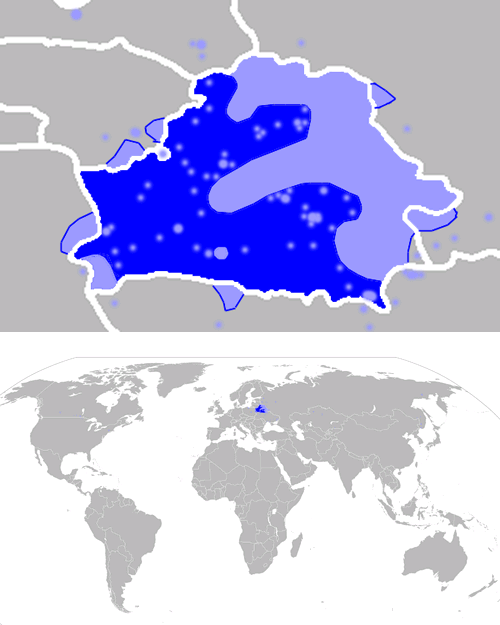  BelarusanLanguage BelarusanLanguage
|

|
Sigma KEE - BelarusanLanguage

|
|
BelarusanLanguage
|
|
The BelarusanLanguage is an EastSlavicLanguage of Belarus. SIL code: RUW. ISO 639-1: be. ISO 639-2: bel. Population: 7,905,000 in Belarus, 98% of the population (1993 Johnstone). Population total all countries: 10,200,000. 74% of the ethnic group from the former USSR speak it as mother tongue. Region: Also spoken in Azerbaijan, Canada, Estonia, Kazakhstan, Kyrgyzstan, Latvia, Lithuania, Moldova, Poland, Russia (Europe), Tajikistan, Turkmenistan, Ukraine, USA, Uzbekistan. Alternate names: BELARUSIAN, BELORUSSIAN, BIELORUSSIAN, WHITE RUSSIAN, WHITE RUTHENIAN, BYELORUSSIAN. Dialects: NORTHEAST BELARUSAN (POLOTS, VITEB-MOGILEV), SOUTHWEST BELARUSAN (GRODNEN-BARANOVICH, SLUTSKO-MOZYR, SLUTSKA-MAZYRSKI), CENTRAL BELARUSAN. Comments: Linguistically between Russian and Ukrainian, with transitional dialects to both. National language. Cyrillic script used. Christian, Muslim (Tatar). Bible 1973. Also spoken in: Poland. (Language name: BELARUSAN.) Population: 230,000 in Poland (1993 Johnstone). Alternate names: BYELORUSSIAN, WHITE RUSSIAN. Comments: Cyrillic alphabet. Bible 1973.(extract from http://www.ethnologue.com/)
|
|
Relationships
|
|
|
|
| Instances | ContentBearingPhysical | Any Object or Process that expresses content. This covers Objects that contain a Proposition, such as a book, as well as ManualSignLanguage, which may similarly contain a Proposition. |
| | EastSlavicLanguage | Of the 18 SlavicLanguages, four are classified as an EastSlavicLanguage.(extract from http://www.ethnologue.com/) |
| | Entity | The universal class of individuals. This is the root node of the ontology. |
| | HumanLanguage | The subclass of Languages used by Humans. |
| | IndoEuropeanLanguage | There are 433 languages categorized as an IndoEuropeanLanguage, forming a major family of the world's languages and including many of the most familiar languages of Europe and South Asia.(extract from http://www.ethnologue.com/) |
| | Language | A system of signs for expressing thought. The system can be either natural or artificial, i.e. something that emerges gradually as a cultural artifact or something that is intentionally created by a person or group of people. |
| | LanguageFamily | A LanguageFamily is group of SpokenHumanLanguages related through descent from a common ancestral language. (reference from https://en.wikipedia.org/wiki/Language_family) |
| | LinguisticExpression | This is the subclass of ContentBearingPhysical which are language-related. Note that this Class encompasses both Language and the the elements of Languages, e.g. Words. |
| | NaturalLanguage | The subclass of HumanLanguages which are not designed and which evolve from generation to generation. This Class includes all of the national languages, e.g. English, Spanish, Japanese, etc. Note that this class includes dialects of natural languages. |
| | Physical | An entity that has a location in space-time. Note that locations are themselves understood to have a location in space-time. |
| | SlavicLanguage | A SlavicLanguage is any of 18 closely related IndoEuropeanLanguages spoken in central and eastern Europe.(extract from http://www.ethnologue.com/) |
|
Belongs to Class
|
IndoEuropeanLanguage |
| | |
 |
Show full definition (without tree view)
Show full definition (with tree view)
|